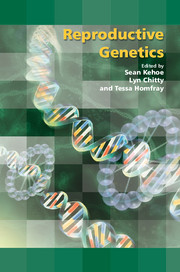Book contents
- Frontmatter
- Contents
- Participants
- Declarations of personal interest
- Preface
- 1 Genetic aetiology of infertility
- 2 Disorders of sex development
- 3 Preimplantation genetic diagnosis: current practice and future possibilities
- 4 Ethical aspects of saviour siblings: procreative reasons and the treatment of children
- 5 Epigenetics, assisted reproductive technologies and growth restriction
- 6 Fetal stem cell therapy
- 7 Prenatal gene therapy
- 8 Ethical aspects of stem cell therapy and gene therapy
- 9 Fetal dysmorphology: the role of the geneticist in the fetal medicine unit in targeting diagnostic tests
- 10 Fetal karyotyping: what should we be offering and how?
- 11 Non-invasive prenatal diagnosis: the future of prenatal genetic diagnosis?
- 12 Non-invasive prenatal diagnosis for fetal blood group status
- 13 Selective termination of pregnancy and preimplantation genetic diagnosis: some ethical issues in the interpretation of the legal criteria
- 14 Implementation and auditing of new genetics and tests: translating genetic tests into practice in the NHS
- 15 New advances in prenatal genetic testing: the parent perspective
- 16 Informed consent: what should we be doing?
- 17 Consensus views arising from the 57th Study Group: Reproductive Genetics
- Index
10 - Fetal karyotyping: what should we be offering and how?
Published online by Cambridge University Press: 05 February 2014
- Frontmatter
- Contents
- Participants
- Declarations of personal interest
- Preface
- 1 Genetic aetiology of infertility
- 2 Disorders of sex development
- 3 Preimplantation genetic diagnosis: current practice and future possibilities
- 4 Ethical aspects of saviour siblings: procreative reasons and the treatment of children
- 5 Epigenetics, assisted reproductive technologies and growth restriction
- 6 Fetal stem cell therapy
- 7 Prenatal gene therapy
- 8 Ethical aspects of stem cell therapy and gene therapy
- 9 Fetal dysmorphology: the role of the geneticist in the fetal medicine unit in targeting diagnostic tests
- 10 Fetal karyotyping: what should we be offering and how?
- 11 Non-invasive prenatal diagnosis: the future of prenatal genetic diagnosis?
- 12 Non-invasive prenatal diagnosis for fetal blood group status
- 13 Selective termination of pregnancy and preimplantation genetic diagnosis: some ethical issues in the interpretation of the legal criteria
- 14 Implementation and auditing of new genetics and tests: translating genetic tests into practice in the NHS
- 15 New advances in prenatal genetic testing: the parent perspective
- 16 Informed consent: what should we be doing?
- 17 Consensus views arising from the 57th Study Group: Reproductive Genetics
- Index
Summary
Background
Prenatal diagnosis (PND) for fetal chromosome abnormalities (karyotyping) began in the UK in the late 1970s with the introduction of amniocentesis followed by chorionic villus sampling (CVS). Amniotic fluid (AF) and CVS cell culture technologies were adopted by the 23 regional cytogenetic laboratories and the patient ascertainment group was initially restricted exclusively to women with age-related risk of Down syndrome pregnancies. Since then, a PND service has become available in all developed countries. Within the UK, approximately 30000 chromosomal PNDs are performed each year, the vast majority of which are following risk screening protocols and tests defined by the UK National Screening Committee (NSC) policy on Down syndrome screening in pregnancy or, more rarely, because of maternal age alone or maternal anxiety. Following screening, women defined as ‘at risk’ for Down syndrome pregnancies or other trisomies are offered invasive PND and, for the vast majority of women, their AF or CVS samples are sent for karyotyping at the local regional cytogenetic centre.
Although prenatal karyotyping has historically been considered the ‘gold standard’ test following invasive PND, the karyotyping technology has developed very little from that first introduced in the 1970s and, despite some improvements in the recent past, turnaround times in the UK for a prenatal karyotype still remains around 2 weeks for most women and clinicians (Figure 10.1), and these turnaround times show significant interlaboratory variation (Figure 10.2).
Keywords
- Type
- Chapter
- Information
- Reproductive Genetics , pp. 147 - 158Publisher: Cambridge University PressPrint publication year: 2009

